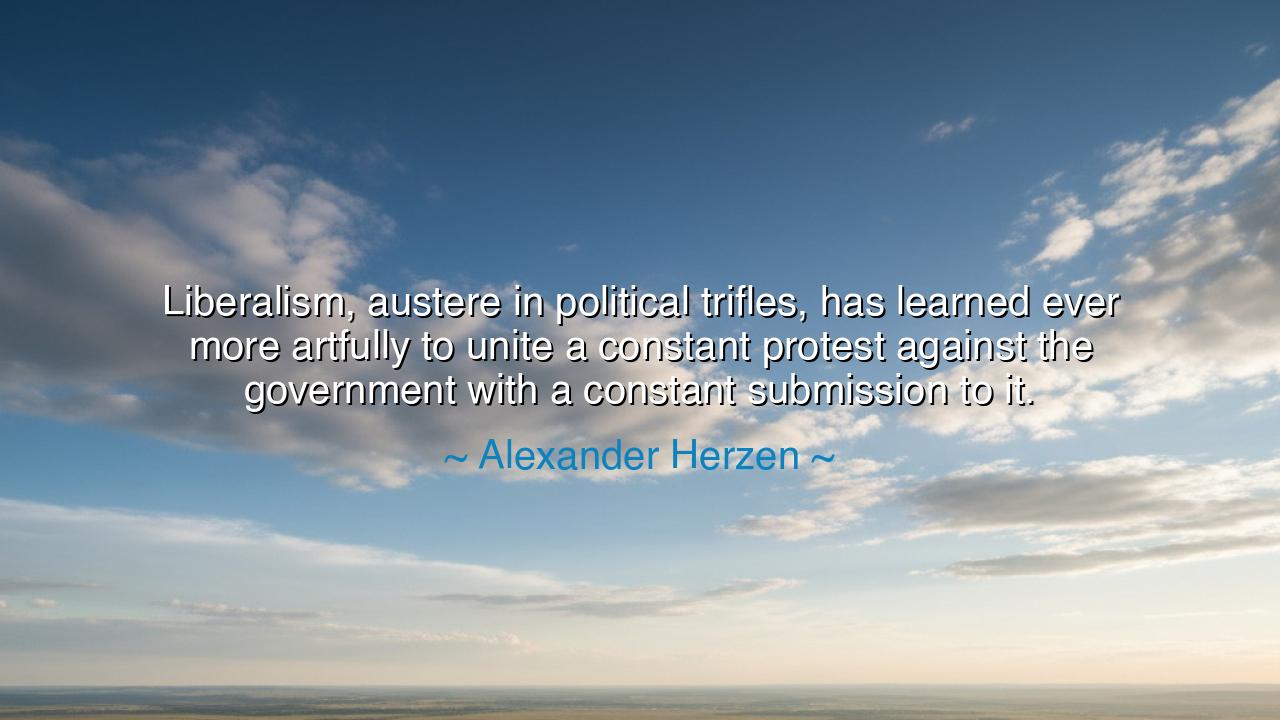
Liberalism, austere in political trifles, has learned ever more
Liberalism, austere in political trifles, has learned ever more artfully to unite a constant protest against the government with a constant submission to it.






"Liberalism, austere in political trifles, has learned ever more artfully to unite a constant protest against the government with a constant submission to it." So spoke Alexander Herzen, the fiery voice of nineteenth-century Russia, a man who lived between revolution and despair, between the dream of freedom and the cold machinery of power. His words are both lament and revelation — a mirror held before the spirit of modern man. For in this sentence lies the sorrowful truth that liberalism, though it cries out against tyranny, too often bows before it; that it has mastered the art of protest without rebellion, of speech without sacrifice. Herzen saw in his time — and foresaw in ours — the rise of those who shout for liberty, yet shrink from the cost it demands.
In the age when Herzen lived, Russia groaned under the weight of autocracy. The Tsar ruled as a god upon earth, and the people, bound by fear, whispered of freedom only behind closed doors. Herzen, once a believer in the promise of Western liberalism, fled his homeland in hope that Europe — the cradle of enlightenment — might offer a purer vision of justice. Yet what he found disillusioned him deeply. He saw men of intellect and conscience who spoke eloquently of reform, who condemned oppression with passion, but who never risked their comfort to defy it. They wrote essays instead of taking stands; they demanded progress, yet feared its turbulence. In their hearts burned the ember of dissent, but their hands remained cold in submission.
Thus was born his critique: that liberalism, stripped of courage, had become a theatre of words — noble in thought, timid in action. Herzen saw that the liberal mind, once fierce in its pursuit of justice, had learned to protest in ways that cost nothing. It could condemn governments in principle while obeying them in practice; it could demand reform yet fear revolution; it could clothe cowardice in the robes of civility. Such a contradiction, he warned, breeds decay — for a people who protest only in words will be ruled forever by those who act without conscience.
This truth has echoed through every age. Consider the story of Weimar Germany, that fragile republic born between wars. Its citizens, weary of monarchy and bloodshed, prided themselves on their freedom and their modern institutions. Yet when tyranny crept back in the form of fanaticism, many who called themselves liberals raised their voices but not their arms. They objected in salons, debated in cafés, wrote in journals — yet when the test of courage came, they submitted to the march of despotism. The lesson was written in fire: that the habit of mild protest, unaccompanied by action, is but a prelude to enslavement.
But Herzen’s words do not condemn all who call themselves liberal; rather, they awaken the sleeping conscience. For austere in political trifles means that such men cling to decorum in small matters — to polite procedures, to the rituals of legality — while the great moral battles rage untouched. They fear the disorder of upheaval more than the injustice of silence. And so, they make peace with oppression, provided it wears a gentle face. Yet history shows that liberty has never been born from decorum; it has been born from courage, from the willingness to risk the order of today for the justice of tomorrow.
The meaning of Herzen’s wisdom, therefore, is both chastening and redemptive. He teaches that true freedom demands more than opinion — it demands participation, sacrifice, and moral steadfastness. To protest is not enough if one still submits; to speak of freedom without acting for it is to become complicit in one’s own chains. Herzen’s own life was proof of this creed: exiled, hunted, and disillusioned, he never ceased to write, to provoke, to awaken those who slumbered beneath tyranny’s weight. His pen was his rebellion, his exile his testimony.
The lesson for our time is clear: beware the comfort of words untested by deeds. It is easy to condemn corruption from a safe distance; it is harder to confront it with one’s life. Let each person, therefore, ask not only, “Do I speak against injustice?” but “Do I live against it?” For a free society depends not upon those who complain of their rulers, but upon those who refuse to be ruled unjustly.
So, O listener, remember Herzen’s lament as a call to awakening: never let protest become a ritual, nor submission a habit. The world does not change through elegant speeches or timid reforms — it changes through courage, through conviction, through the fire of those who will not bow. Let your life be more than complaint; let it be a stand. For liberty cannot live by words alone — it breathes only through the hearts of those who dare to act.






AAdministratorAdministrator
Welcome, honored guests. Please leave a comment, we will respond soon